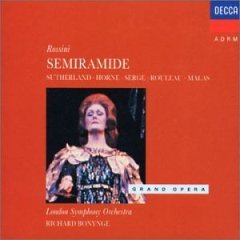Gioachino Rossini – Semiramide (Bonynge) [1966]
Gioachino Rossini – Semiramide (Bonynge) [1966]

CD1 1. Semiramide – Overture 2. Semiramide/Act 1 - Sì...Gran Nume...T'intesi play 3. Semiramide/Act 1 - Suoni Festevoli 4. Semiramide/Act 1 - Là Dal Gange A Te Primiero 5. Semiramide/Act 1 - Di Plausi Qual Clamor 6. Semiramide/Act 1 - Di Tanti Regi E Popoli 7. Semiramide/Act 1 - Ah! Già Il Sacro Foco È Spento 8. Semiramide/Act 1 - Eccomi Al Fine In Babilonia 9. Semiramide/Act 1 - ''Ah! Quel Giorno Ognor Rammento'' 10. Semiramide/Act 1 - Io T'attendeva, Arsace 11. Semiramide/Act 1 - Bella Imago Degli Dei CD2 1. Semiramide/Act 1 - Serena E Vaghi Rai 2. Semiramide/Act 1 - Bel Raggio Lusinghier 3. Semiramide/Act 1 - Dolce Pensiero 4. Semiramide/Act 1 - Mitrane! E Che Rechi? 5. Semiramide/Act 1 - ''Serbami Ognor'' 6. Semiramide/Act 1 - Alle Più Calde Immagini 7. Semiramide/Act 1 – Marcia 8. Semiramide/Act 1 - Ergi Omai La Fronte Altera 9. Semiramide/Act 1 - Vostri Voti Omai 10. Semiramide/Act 1 - L'alto Eroe 11. Semiramide/Act 1 - Qual Mesto Gemito Dame Joan Sutherland 12. Semiramide/Act 1 - D'un Semidio Che Adoro play 13. Semiramide/Act 1 - Ah! Sconvolta Nell'ordine Eterno CD3 1. Semiramide/Act 2 - Assur, I Cenni Miei 2. Semiramide/Act 2 - Se La Vita Ancor T'è Cara 3. Semiramide/Act 2 - Quella, Ricordati 4. Semiramide/Act 2 - La Forza Primiera 5. Semiramide/Act 2 - Ebben, Compiasi Omai 6. Semiramide/Act 2 - In Si Barbara Sciagura 7. Semiramide/Act 2 - Su, Ti Scuoti 8. Semiramide/Act 2 - No: Non Ti Lascio 9. Semiramide/Act 2 - Ebben... A Te; Ferisci 10. Semiramide/Act 2 - Giorno D'orrore 11. Semiramide/Act 2 - Madre – Addio 12. Semiramide/Act 2 - La Speranza Più Soave 13. Semiramide/Act 2 - Sì, Sperar Voglio Contento 14. Semiramide/Act 2 - Il Dì Già Cade 15. Semiramide/Act 2 - Deh! Ti Ferma 16. Semiramide/Act 2 - Que'numi Furenti 17. Semiramide/Act 2 - Qual Densa Notte! 18. Semiramide/Act 2 - Al Mio Pregar T'arrendi 19. Semiramide/Act 2 - Dei! Qual Sospiro 20. Semiramide/Act 2 - Ninia! Ferisci! play Semiramide - Joan Sutherland Arsace - Marilyn Horne Assur - Joseph Rouleau Idreno - John Serge Azema - Patricia Clark Oroe - Spiro Malas Mitrane - Leslie Fyson L'ombra di Nino - Michael Langdon The Ambrosian Opera Chorus London Symphony Orchestra Richard Bonynge, 1965-1966
For golden-throated singing, it would be hard to top this classic recording, featuring two great divas at the height of their powers; for a working definition of the term "bel canto," just listen to Joan Sutherland and Marilyn Horne as they make coloratura magic. Never mind the male singers in this recording, though; they're adequate, but, then, they're not the point. Sutherland's Semiramide is a tad maternal in her character, but the singing makes up for any shortcomings there, while Horne is clearly having the time of her life as the warrior Arsace. Richard Bonynge conducts optimally for his singers. For many years this was the only recording available of this tuneful if slightly static opera, and for the quality of its singing it's still the first choice. Unfortunately, there are numerous cuts in the score, so critical-edition buffs will have to seek elsewhere, or do without. --Sarah Bryan Miller
First performed in Venice in 1823, Rossini's Semiramide was once famously called the last and most beautiful of the great baroque operas. The description is in some respects inaccurate: later Italian composers looked back to it on occasion, and Verdi's Aida unquestionably owes something to its monumentality. Yet its potent mix of classical dramaturgy and vocal athleticism also mark Rossini out as heir to musical traditions rooted in the 18th century and far removed from the ideals of contemporary Romanticism. It's an extreme work, at once startling and unique.
Rossini's source is a play by Voltaire that overlays the legend of Semiramide, the promiscuous queen of Babylon, with echoes of the myths of Orestes and Oedipus, together with overtones of Macbeth. Long before the drama opens, Semiramide conspired with her former lover Assur to poison her husband, King Nino, and seize his throne. Now wracked by guilt and stalked by Nino's Banquo-like ghost, she finds herself sexually drawn to the young army officer Arsace (played by a mezzo), in terrible ignorance not only of the fact that he is her long-lost son, but that he has also been divinely appointed to avenge his father's death. Rossini takes his protagonists to their technical and expressive limits in order to explore the often monstrous emotions that result. ---Tim Ashley, theguardian.com
download: uploaded yandex 4shared mediafire solidfiles mega zalivalka filecloudio anonfiles oboom
Zmieniony (Piątek, 18 Kwiecień 2014 14:42)








